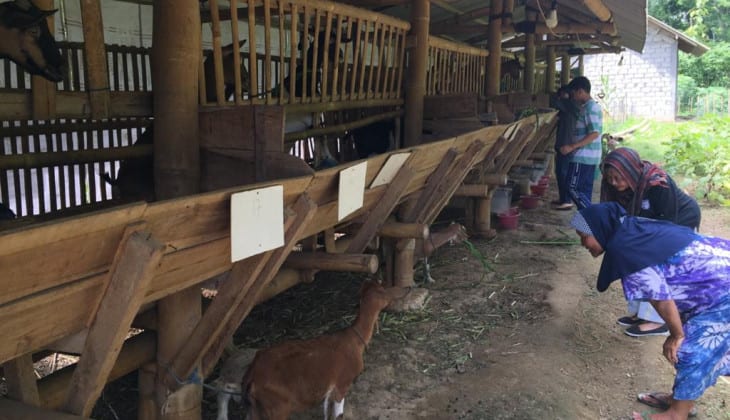

The Department of Animal Nutrition and Feed Science, Faculty of Animal Science UGM was driven to empower women farmer groups in several areas around Yogyakarta by giving assistance in the field of animal science. Prof. Dr. Ir. Kustantinah, DEA., IPU., the coordinator, said that members of women farmer groups were equipped with animal husbandry skills; steps to make stilt cages, introduction of forage, forage planting during the rainy season to be reserved for the dry season, and forage use as an anti-parasitic material, waste treatment and mating.
“We also teach milk processing, especially in the women’s group on the slopes of Merapi,” Kustantinah said on Thursday (4/23).
Albeit in the middle of the Covid-19 pandemic, Kustantinah and colleagues continue to communicate with members of the farmer group and provide consultation to them via mobile phones. She added that each region has its own potential and types of livestock, but small ruminants such as goats or sheep are always chosen because they will be raised by women. It is expected to be not too difficult or heavy. “These goats are considered gaduhan, thus must be rolled out to new members,” she said.
She said members of women farmer groups are mothers who are used to farming and raising livestock. However, access to forage is so important that members must own a land, be it their own land, or being land tenants. “Our hope is that access to forage is not a problem. Likewise, water must be available, even during the dry season, ” she explained.
Kustantinah revealed that the group members were highly disciplined in carrying out these activities, leading to satisfying results. These empowerment activities can help members improve their welfare. This can be seen from the increase in the number of livestock raised. Because of this members can sell their livestock production for basic family needs, medication, schools, house repairs, bathrooms, and other urgent needs, and mostly for savings.
“This is in line with the objectives of raising livestock in the countryside. In general, livestock raising means savings that will be easily cashed if needed. For members who have land, they can use plants or agricultural by-products for animal feed, ” she said.
Training for women farmers around Yogyakarta has started since 1999, starting in Kwarasan Hamlet, Kedung Keris Village, Nglipar District, and Gunung Kidul Regency. The activity was carried out in collaboration with the Department of Nutrition and Feed Science of the Faculty of Animal Science UGM and Aberdeen University, Scotland, sponsored by DFID, British Council. Kustantinah and her team accompanied more women farmer groups in Gombang Village, Ponjong District, Banyusoca Village, Playen District, and Wonolagi Hamlet in Playen District, Gunungkidul Regency. In Sleman Regency, the training was held for the women’s group Gama Turgo Lestari in Turgo Village, Pakem District, Sleman Regency. The same activity also took place in Kulon Progo Regency.
The Department of Animal Nutrition and Feed Science no longer accompanies these women’s groups routinely because now they are able to independently manage their livestock. The group that is still assisted is Gama Ngudi Lestari group in Gombang Village, Playen District and Sumber Rejeki Gama Women’s Group in Ngleri Village, Wonolagi Hamlet, Playen District, in Gunungkidul Regency, as well as the Gama Turgo Lestari group in Turgo Village, Pakem District, Sleman Regency. The name Gama is used because it is under the guidance of lecturers at the Faculty of Animal Science, UGM.
The Gama Sumber Rejeki Women Farmer Group in Ngleri Village, Wonolagi Hamlet, is located in an area that is the most difficult to reach. This area is surrounded by forests managed by Perhutani and UGM (WANAGAMA Forest), another access is separated by a river, the Oya River which is useful to provide forage during the dry season, but there is no bridge connecting the village to other villages. “We finally initiated the construction of this bridge with our partners,” she said.
For the Gama Sumber Rejeki women’s group, Wonolagi Hamlet, Ngleri Village, Kustantinah developed a germplasm of kambing kacang (literally translated as “nut goat”). Kambing kacang is a goat that has a small body but is originally from Indonesia. Its population, especially in Java, is very small and can only be obtained or maintained by people in West Java (Serang). Seeing this, Kustantinah and staff of the Department of Animal Nutrition and Feed Science, Faculty of Animal Science UGM, were determined to develop kambing kacang which is an Indonesian germplasm based on women farmer groups. “This activity is ongoing in the hope that if it is successfully developed, it can then be used as a model for the development of Indonesian germplasm livestock,” she said.
Aside from serving as a community service, assistance for women farmer groups also serves as research and practicum platforms for students. Thus, students can learn firsthand about the conditions of animal husbandry in the community. “Many undergraduate, master and doctoral students graduated by taking part in this activity,” she concluded.
Writer: Gusti Grehenson
Source: https://ugm.ac.id/id/berita/19330-ugm-berdayakan-kelompok-wanita-tani-lewat-budi-daya-kambing-kacang



